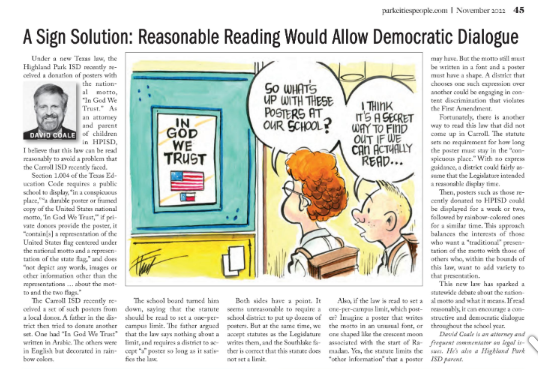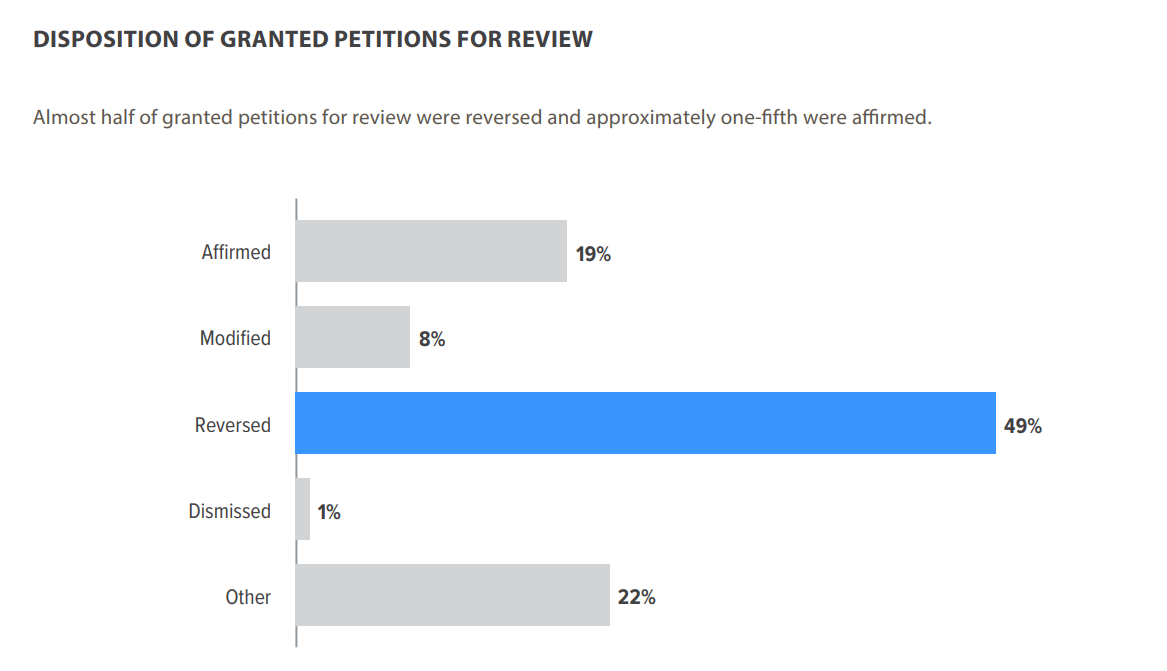I’m in the newest issue of Park Cities People, talking about the “Poster Wars” under the new Texas law about posters that feature the national motto:
Monthly Archives: October 2022
In 2018, a mentally disturbed individual scaled the six-foot fence around an apartment complex and killed a resident. Wang v. TREA Churchill affirmed summary judgment for the defense, reviewing several aspects of what constitutes sufficient proof of foreseeability in this setting. No. 05-21-00880-CV (Oct. 24, 2022) (mem. op.).
Grisaffi v. Rocky Mountain High presents an unusual situation involving the “one-satisfaction rule” (and the choice it requires between recovery of stock and damages for the loss of the same stock), the “mandate rule” requiring an election pursuant to that rule, and the effect of another proceeding arguably implicating the subject matter of this case. The majority affirmed, finding a faithful application of the mandate rule; a dissent had a different view about the import of the other action. No. 05-20-00538-CV (Oct. 18, 2022) (mem. op.).
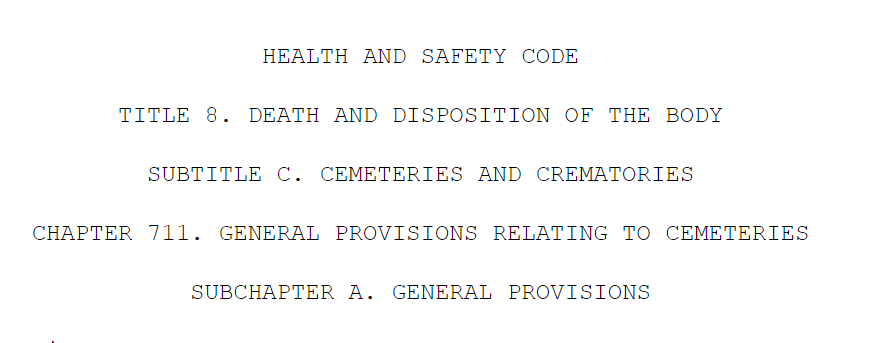 The plaintiff in Kivowitz v. Dorfman sought to “remove his deceased parents’ remains from mausoleum crypts on Hillcrest’s property.” The defendants had a different view; the unfortunate cemetery operators were stuck in the middle. The resulting litigation contributes to the – body – of law about recoverability of attorneys’ fees in declaratory-judgment cases.
The plaintiff in Kivowitz v. Dorfman sought to “remove his deceased parents’ remains from mausoleum crypts on Hillcrest’s property.” The defendants had a different view; the unfortunate cemetery operators were stuck in the middle. The resulting litigation contributes to the – body – of law about recoverability of attorneys’ fees in declaratory-judgment cases.
“Caught between competing demands and mindful of its statutory and contractual obligations,” the cemetery sought a declaratory judgment, and “took no position regarding appropriate disposition of the Decedents’ remains.” The trial court issued a declaratory judgment that the plaintiff was right, and assessed attorneys’ fees of $191,245.25 against the cemetery pursuant to the Declaratory Judgment Act.
The cemetery appealed, noting that the (surprisingly detailed) provisions about the handling of human remains in the Health & Safety Code did not allow for the recovery of fees. The Fifth Court agreed and reversed, citing primarily MBM Fin. Corp. v. Woodlands Operating Co., 292 S.W.3d 660, 669 (Tex. 2009) (“[A] party cannot use the [Declaratory Judgments] Act as a vehicle to obtain otherwise impermissible attorney’s fees.”). Put another way, the plaintiff did not urn a fee award by his suit.
The Fifth Court’s recent opinion, In the Interest of CJP, makes a somewhat gloomy observation about a Texas Supreme Court decision to grant review, quoting the Texas Law Review‘s style manual: No. 05-22-00233-CV (Oct. 14, 2022) (mem. op.). The paper about internal operating procedure on the supreme court’s website paints a less-gloomy picture, however:
No. 05-22-00233-CV (Oct. 14, 2022) (mem. op.). The paper about internal operating procedure on the supreme court’s website paints a less-gloomy picture, however: As do the reversal statistics for 2021 available from the Office of Court Administration:
As do the reversal statistics for 2021 available from the Office of Court Administration:
The Texas Supreme Court has preliminarily approved a welcome new rule about the effect of requesting oral argument: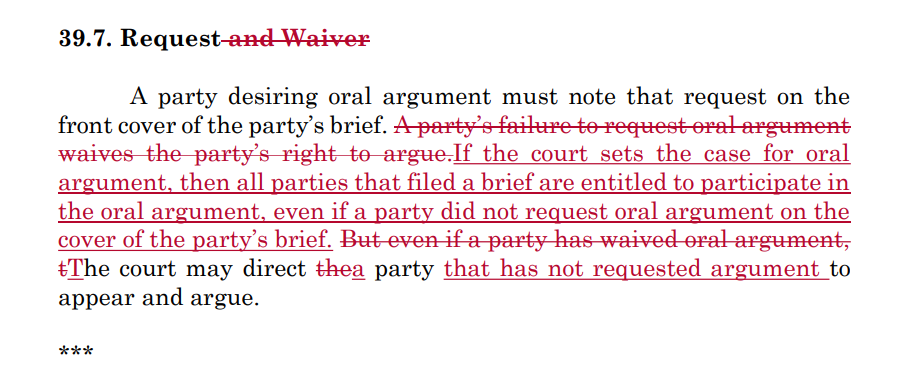
 The Stantons sued a construction contractor who did work on a commercial property near their home. The contractor sought to compel arbitration, arguing that their claim implicated an arbitration agreement in its contract with the relevant subcontractor. But the Stantons countered with evidence that the excavation work at issue was performed under a separate contract, directly with the property owners.
The Stantons sued a construction contractor who did work on a commercial property near their home. The contractor sought to compel arbitration, arguing that their claim implicated an arbitration agreement in its contract with the relevant subcontractor. But the Stantons countered with evidence that the excavation work at issue was performed under a separate contract, directly with the property owners.
The trial court denied the motion to compel arbitration. The Fifth Court affirmed. It noted the principle that “a bilateral agreement to arbitrate under the AAA rules constitutes clear and unmistakable evidence of the parties’ intent to delegate the issue of arbitrability to the arbitrator.” But that said, “[t]he subcontract between [the general] and [the sub] is not a bilateral contract with the Stantons.” Therefore, the trial court retained the authority to determine arbitrability. Scott + Reid General Contractors, Inc. v. Stanton, No. 05-22-00400-CV (Oct. 7, 2022) (mem. op.).
In a ruling that arose from an unusual joint mandamus petition, and drew significant amicus attention from trial-focused organizations, the Texas Supreme Court granted mandamus relief on October 7 as to an order requiring a virtual trial:
The Onion, America’s Finest News Source, recently weighed in at SCOTUS with a brilliant amicus brief about First Amendment protection for parody; this excerpt summarizes the overall flavor:
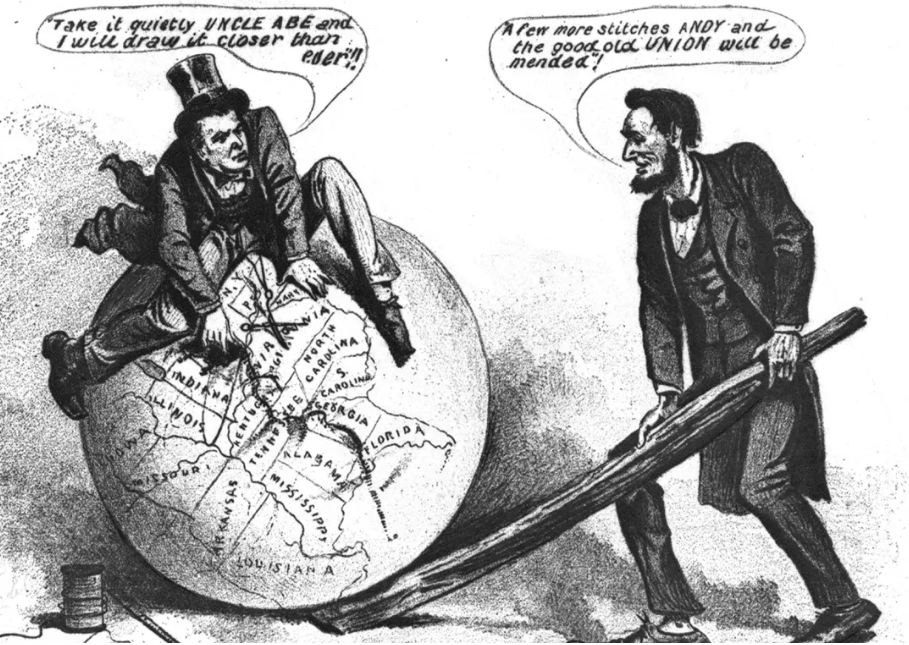 An unusual feature of Texas’s Reconstruction-era constitution is that it places county prosecutors in the judicial branch of government rather than the executive. As a result, last December, the Court of Criminal Appeals found a law unconstitutional that attempted to give the Texas AG prosecutorial authority over certain Election Code violations. Last week that court denied rehearing – given the several individual opinions and extensive briefing in the matter, here is a link to the case generally, from which one can find the original opinion and the various documents related to rehearing.
An unusual feature of Texas’s Reconstruction-era constitution is that it places county prosecutors in the judicial branch of government rather than the executive. As a result, last December, the Court of Criminal Appeals found a law unconstitutional that attempted to give the Texas AG prosecutorial authority over certain Election Code violations. Last week that court denied rehearing – given the several individual opinions and extensive briefing in the matter, here is a link to the case generally, from which one can find the original opinion and the various documents related to rehearing.
